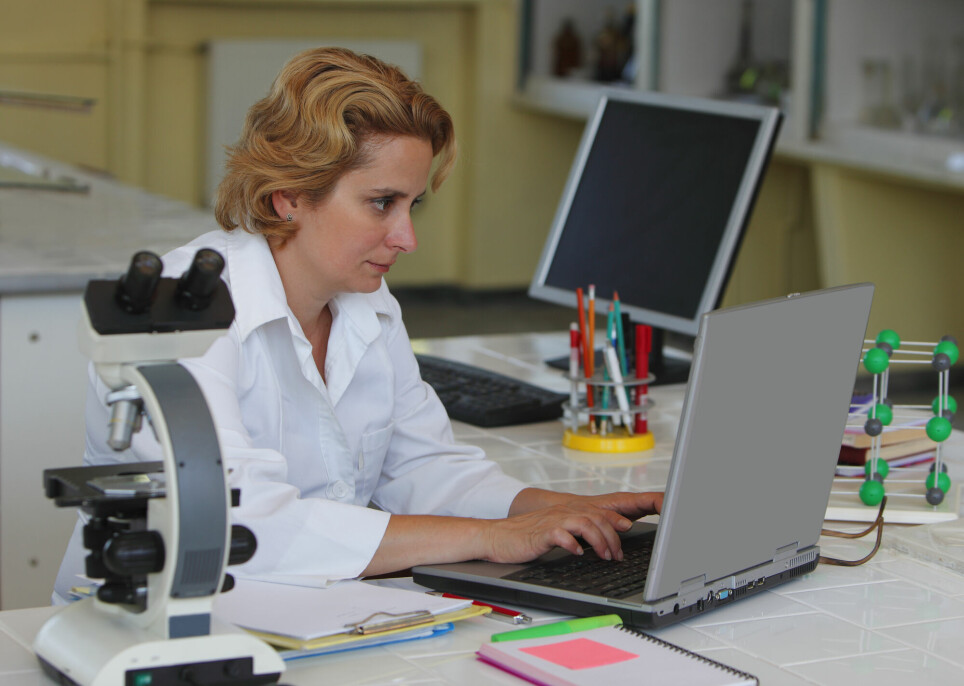
Norwegian researchers work on average 46 hours per week
Researchers with foreign citizenships work the most – and thus contribute to increasing this average.
Norwegian academics have been asked how many hours they work every week, and how many of these hours they get to spend doing research.
The normal Norwegian work week is 37,5 hours, in other words 7,5 hours per day.
An average work week in academia, however, is 46 hours – 49 if you’re a professor. PhD students go at it 44 hours per week.
When academics were asked the same questions five years ago, the hours worked had gone down, compared to 2010-statistics. They have now gone up again.
The total number of hours spent doing research has gone down. More hours are instead spent on teaching.
The foreigners work the most
The survey has for the first time also included questions of citizenship.
“This gave us some interesting numbers”, Kaja Wendt from NIFU, the Nordic Institute for Studies innovation, research and education, said to sciencenorway.no.
Around 40 per cent of PhD candidates in Norway are foreign citizens. It is a well-known debate in Norwegian academia that these foreign citizens tend to work more than their Norwegian peers, and how that may impact on Norwegian academia as such.
The work-time-survey from NIFU confirms this: “Throughout the survey we see that researchers with foreign citizenship work the most”, Wendt says.
The biggest differences between Norwegians and foreign citizens are between the professors. But foreign PhD students also work on average more than the Norwegians.
While the Norwegian professors work just under 49 hours per week, the foreign professors clock 51 hours.
“In other words, the foreign researchers contribute to increase the average levels for work in Norwegian academia”, Wendt says.
Efficient or lazy?
The union magazine Forskerforum has written extensively on the topic of foreigners in Norwegian academia, for instance about the fact that foreign citizens also dominate among those who publish the most.
“All foreigners learn quite quickly that when the clock strikes 4, you’re alone in the office”, professor Malcolm Langford at the University of Oslo said to the magazine in 2019.
According to the professor however, Norwegians are very efficient and have very short lunches – which they bring with them to work from home – so in reality they may get as much done as their foreign colleagues. A fair few of the foreign citizens who chose to stay in Norwegian academia also do it because of the Norwegian model, he says.
Professor Vincent Eijsink at NMBU, however, says to the magazine that he believes some of his colleagues would do good to work a little more.
“To say that work life in Norway is tough is ridiculous”, he says. “We have extremely good conditions, and seen from the outside, the pay for PhD’s is way beyond what you get in other countries. There are many good things with the Norwegian welfare system, but it does have negative consequences for research”, he claims.
More teaching, less research
For researchers, post docs and PhD students, the average time spent doing research has gone down considerably compared to when the NIFU-survey was last done, in 2016.
On average, PhD students use 70 per cent of their time doing research, while post docs and researchers spend about 60 per cent of their time doing research.
Professors spend about 30 per cent of their time doing research – same as five years ago.
Gender differences
Women work fewer hours than their male peers early on in their careers.
Male PhD students work more than two hours on average more than their female peers.
“This may have something to do with responsibilities for children”, says Wendt.
“But we haven’t asked about this, so we can’t know for sure”.
However, those who reach the level of professor work more than their male peers. Female professors with foreign citizenship work the longest hours.
- RELATED: Norwegian academics face serious work-family life conflicts
- RELATED: Women are not formally discriminated against in Norwegian academia – but they still don’t become professors
———
Read the Norwegian version of this article on forskning.no

































